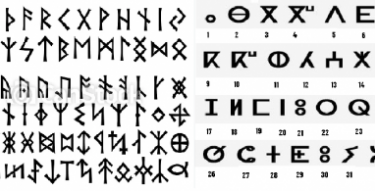“Hapax legomenon” is an expression in Greek for the (rather rare) linguistic phenomenon in which a word appears only once in a text. However, the number of “hapax legomenon” in the Koran is unique: several hundred, or even more than a thousand if we add the bi-legomenon (2 occurrences) and the tri-legomenon (3 occurrences)!
We do not find this breathtaking figure in any other text, religious or not. The Bible, for example, contains only a few dozen.
How to explain this phenomenon so specific to the Koran and which gives it an appearance of “richness of vocabulary”, when in fact it testifies to an incredible poverty?
The answer is obvious: The idiom of the Koran is not a language, but a kind of “Esperanto” of the Middle East, an artificial idiom composed and made ad hoc from 3 languages: Himyarite, Hebrew, and Aramaic (in its late “Syriac” variant). To the vocabulary of these 3 languages on which the “Koranic Esperanto” is forged, we must add some borrowings from Greek, Persian, and Ethiopian.
And this is the reason why the Quranic idiom sounds so “enigmatic” to the ears of “Arabic speakers” (aside from a few linguistic experts), who are unable to “decipher” the Koran. How many of them, including some of the most literate and cultured, can actually understand, for example, the meaning (and etymology) of a term like “abariq” (وَأَبَارِيق ) which actually comes from the Hebrew “bareqet” (ברקת) and which designates a cup “sparkling like lightning” (therefore set with precious stones such as the emerald, fixed to the breastplate of the Great Cohen. See Bible, Exodus 39, 10).
It is also from the root BRQ of this Hebrew word that the Muslim tradition coined the name of the legendary winged mount of Muhammad, al burâq – in Arabic, البراق -, to describe in fact that his steed was “as fast as lightning ”.
But instead of recognizing the artificial and late fabrication of the Quranic Esperanto (not before the beginning of the 7th century AD), the “Arabic speakers” praise it by attributing to the puzzling phenomenon of the multitude of its “hapax legomenon” , a … divine origin (“the language of Allah”)!
Professor David Belhassen




Leave a Comment